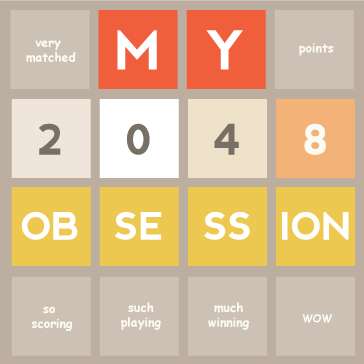As I write this, it has been 1 day, 13 hours, and 24 minutes since I last played 2048.
For those who have never heard of 2048, the new single-player video game first launched in Italy in March, 2014. The objective of the game—started by 19-year-old Gabriele Cirulli—is to combine numbered tiles on a grid to create the 2048 tile. It seems like a fun, simple, and predictable procrastination tool. But it has spread across the globe like a raging epidemic, destroying the lives of countless misinformed people.
Two week ago I noticed a friend’s Facebook status stating that he had just won 2048. Prior to this, I was sheltered and ignorant to the game’s appeal. Out of curiosity I clicked on the link and began arbitrarily tapping my arrow keys. After closing the window, I thought little of the incident as I went about the rest of my day.
With some spare time between classes the following day, I opened the link on my browser for the second time. Little did I know then that this exact moment would trigger my rapid downward spiral. The rest of the afternoon is a blur. Fuelled by Tim Hortons coffee, I found myself lost in the sea of orange squares in the early hours of the morning.
Every combination of numbers gave me a feeling of satisfaction and I yearned for the exhilaration when navigating out of a nearly filled grid. Soon, it became the first thing I did in the morning and the last thing I did before bed. In the library, instead of studying for my economics midterm, I passed minutes and then hours trying to reach that golden number. I distanced myself from friends and family. I stopped listening during conversation with my thoughts entangled in my urge to play the next game. The combination of 2048 while watching Parenthood on Netflix was even more precarious, and I’d go on day-long binges completely enthralled and stuck on an emotional roller-coaster that I never wanted to end.
Nonetheless, no one seemed to notice that anything was wrong—friends even encouraged me to play. But the game began to haunt me— even when I wasn’t actually playing, it was on my mind. In class, as I drifted in and out of sleep, I visualized the game behind my weary eyelids.
This isn’t the first time a video game has taken over my life. In high school, my vice was Tetris. All throughout grade 11, I watched the coloured geometric Tetris blocks float through a black abyss in my dreams, until eventually I had to make a clean break from the game.
I realized I needed to do the same for 2048. I deleted the app from my phone and installed Self Control so that I could blacklist the website. I’ve had one relapse since then.
There are many other students across campus struggling with the same demons. At first glance you may not even realize that someone’s a player, but sit behind them in just one lecture and it will soon become clear.
Preliminary statistics reveal that one in every one students has tried playing 2048 at least once in their life, and twenty forty-eighths of these have described feelings of extreme satisfaction when playing Unfortunately, we can only support those who decide for themselves that they are ready to make the transition to a 2048-free life.
As I finish my confession, it has now been 1 day, 20 hours, and 48 minutes.
Swarlee has been out of contact for last three days. Sources have spotted her hiding in McLennan playing Doge 2048. Much problematic. Very sadness.
This story is a work of satire and appeared as part of our April Fools Issue 2014.









This is hardly aprll fools. So much truth.